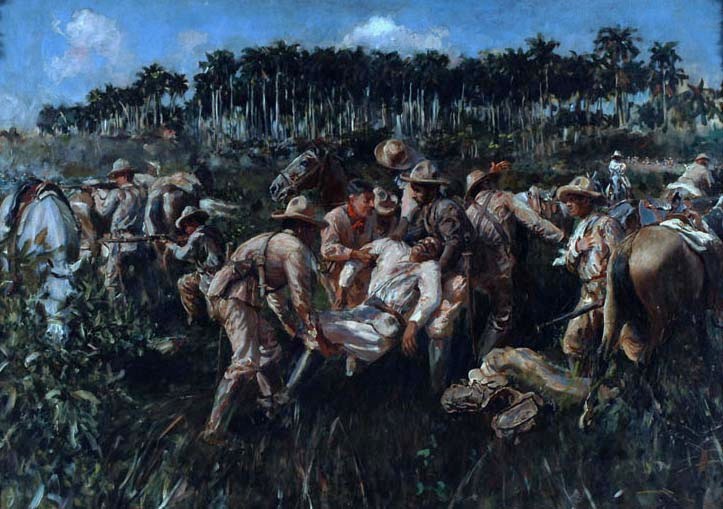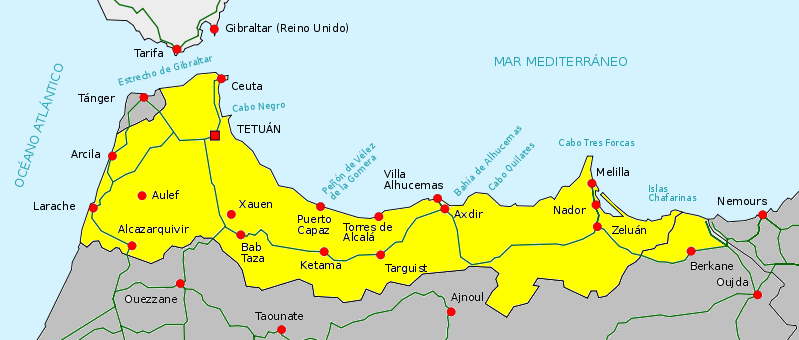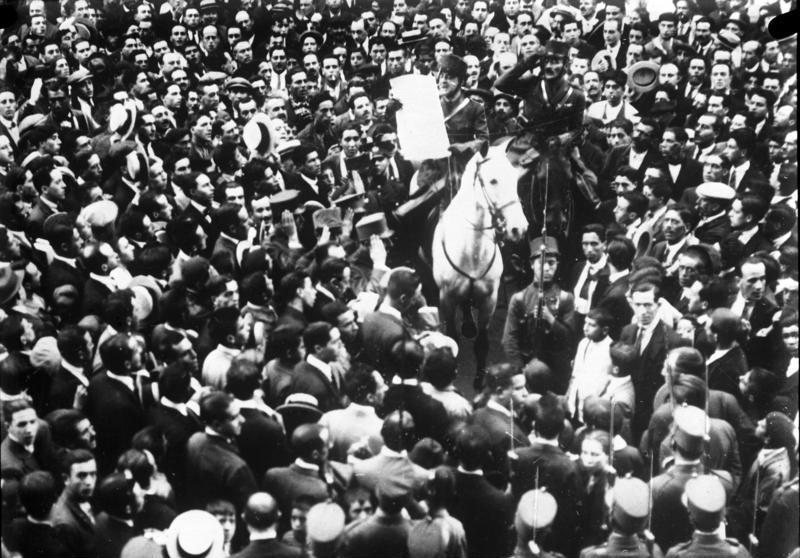|
Francisco Gómez-Jordana Sousa
Francisco Gómez-Jordana y Sousa, 1st Count de Jordana (1 February 1876 – 3 August 1944), was a Spanish soldier and politician who served as Minister of Foreign Affairs during the rule of Francisco Franco. Early life Born in Madrid, the son of an officer who went on to become a General and the High Military Commissioner of Spain in Morocco, Gómez-Jordana enrolled as a student at Spain's "Academia General Militar" (Military General Academy) in Zaragoza in 1892. Early career During the Cuban War of Independence, he went to Cuba as a second lieutenant, where he was wounded on 23 November 1896. After returning to Spain, he became a captain at the Escuela Superior de Guerra ("Higher School for the Conduct of War") in Madrid. In 1911, he went to Melilla, a historical Spanish stronghold in North Africa since 1497, and he joined his father, Colonel Francisco Gómez Jordana. The younger Gómez-Jordana became a lieutenant colonel in 1912 and a colonel in 1915. From 9 July 1915 t ... [...More Info...] [...Related Items...] OR: [Wikipedia] [Google] [Baidu] |
The Most Excellent
The Most Excellent (Spanish language, Spanish: ''Excelentísimo Señor'' (male) or ''Excelentísima Señora'' (female), literally "Most Excellent Sir/Madam") is an honorific prefix that is traditionally applied to certain people in Spain and certain Spanish-speaking countries. Following Spanish tradition, it is an ''ex officio'' style (the holder has it as long as they remain in office, in the most important positions of state) and is used in written documents and very formal occasions. The prefix is similar (but not equal) to that of "Excellency, His/Her Excellency", but in the 19th century "The Most Excellent" began to replace the former. The use of the prefix Excellency was re-introduced in Francoist Spain by ''Generalísimo'' Francisco Franco himself, who was formally styled as ''Military career and honours of Francisco Franco, Su Excelencia el Jefe del Estado'' ("His Excellency The Head of State"), while his ministers and senior government officials continued using the prefix ... [...More Info...] [...Related Items...] OR: [Wikipedia] [Google] [Baidu] |
Cuban War Of Independence
The Cuban War of Independence (), fought from 1895 to 1898, was the last of three liberation wars that Cuba fought against Spain, the other two being the Ten Years' War (1868–1878) and the Little War (1879–1880). The final three months of the conflict escalated to become the Spanish–American War, with United States forces being deployed in Cuba, Puerto Rico, and the Philippine Islands against Spain. Historians disagree as to the extent that United States officials were motivated to intervene for humanitarian reasons but agree that yellow journalism exaggerated atrocities attributed to Spanish forces against Cuban civilians. Background During the years 1879–1888 of the so-called "Rewarding Truce", lasting for 17 years from the end of the Ten Years' War in 1878, there were fundamental social changes in Cuban society. With the abolition of slavery in October 1886, freedmen joined the ranks of farmers and the urban working class. The economy could no longer sustain itse ... [...More Info...] [...Related Items...] OR: [Wikipedia] [Google] [Baidu] |
Ajdir
Ajdir (Berber language, Berber: ⴰⵊⴷⵉⵔ) is a small town in northern Morocco, on the Mediterranean coast, near Al Hoceima. It was the capital of the Republic of the Rif from 1922-1925 under the leadership of Muhammad Ibn 'Abd al-Karim al-Khattabi, Abd el-Krim (d.1963) who born there in 1880. The town lies in the territory of the Ait Waryagher tribe. See also *Aith Ouriaghel External linksCity Of Alhoceima Website (English) Populated places in Al Hoceïma Province Rif Rif War Capitals of former nations {{TangerTetouanAlHoceima-geo-stub ... [...More Info...] [...Related Items...] OR: [Wikipedia] [Google] [Baidu] |
Muhammad Ibn 'Abd Al-Karim Al-Khattabi
Muhammad ibn Abd al-Karim al-Khattabi (; Tarifit: Muḥend n Ɛabd Krim Lxeṭṭabi, ⵎⵓⵃⵏⴷ ⵏ ⵄⴰⴱⴷⵍⴽⵔⵉⵎ ⴰⵅⵟⵟⴰⴱ), better known as Abd el-Krim (1882/1883, Ajdir, Morocco – 6 February 1963, Cairo, Egypt) was a Moroccan political and military leader and the President of the Republic of the Rif. He and his brother M'Hammad led a large-scale revolt by a coalition of Riffian tribes against French and Spanish colonization of the Rif, in Morocco. His guerrilla tactics, which included the first-ever use of tunneling as a technique of modern warfare, directly influenced Ho Chi Minh, Mao Zedong and Che Guevara. Early life Muhammad ibn Abd al-Karim was born in 1882/1883 in Ajdir, Morocco. He was the son of Abd al-Karim al-Khattabi, a qadi (Islamic judge and chief local leader) of the Aith Yusuf clan of the Aith Uriaghel (or Waryaghar) tribe.Hart, pp. 370-371. Abd el-Krim received a customary formative education at a local school in Ajdir and sub ... [...More Info...] [...Related Items...] OR: [Wikipedia] [Google] [Baidu] |
José Sanjurjo
José Sanjurjo y Sacanell (; 28 March 1872 – 20 July 1936), was a Spanish general, one of the military leaders who plotted the July 1936 ''coup d'état'' which started the Spanish Civil War. He was endowed the nobiliary title of "Marquis of the Rif" in 1927. A monarchist opponent of the Second Spanish Republic proclaimed in 1931, he led a ''coup d'état'' known as ''la Sanjurjada'' in August 1932. The authorities easily suppressed the coup and initially condemned Sanjurjo to death, then later commuted his sentence to life imprisonment. The government of Alejandro Lerroux - formed after the 1933 general election - eventually amnestied him in 1934. He took part, from his self-exile in Portugal, in the military plot for the 1936 coup d'état. Following the coup, Sanjurjo, expected by some to become the commander-in-chief of the Nationalist faction, died in an air crash on the third day of the war, when travelling back to Spain. He had chosen to fly in a small, overloaded ... [...More Info...] [...Related Items...] OR: [Wikipedia] [Google] [Baidu] |
Africanist (Spain)
Africanists ( es, Africanistas) were the people who encouraged a strong colonial involvement of Spain in Africa, particularly since the early 20th century. Although Spain had been present in African territory for numerous centuries, it was not until the arrival of New Imperialism and the Berlin Conference in 1884 that the colonial power set its interests in African soil. Africanism emerged mainly from the loss of Cuba, the Philippines, Puerto Rico and various other islands in 1898 as a consequence of the Spanish–American War. Africanists sought to compensate for these losses by consolidating their possessions in Africa. Spain's colonizing Africa was smaller when compared to other European colonizers, even after losing their colonies in the Americas and Pacific, because there was a lack of public support to re-establish themselves as an empire. Spain's economy recovered quickly after the loss of their colonies during the Spanish-American War, and the general population lost their fe ... [...More Info...] [...Related Items...] OR: [Wikipedia] [Google] [Baidu] |
Province Of Jaén (Spain)
Jaén () is a province of southern Spain, in the eastern part of the autonomous community of Andalusia. It is bordered by the provinces of Ciudad Real, Albacete, Granada and Córdoba. Its capital is Jaén city. Its area is 13,484 km². Its population is 657,387 (2003), about one sixth of whom living in the capital. It contains 97 municipalities. The highest point of the province is Pico Mágina (2165 m). One of the less-known provinces of Spain, compared to the tourist-oriented coast, it has four national parks and many other protected natural areas. The province also contains two Renaissance cities, Úbeda and Baeza, both recently declared World Heritage Sites by UNESCO. The province has among the highest concentration of castles in the world outside the Levant, thanks to its strategic position during the ''Reconquista''. The annual chess tournament, held until 2010 in Linares, attracted many of the world's best players. The province is the largest producer of olive oil ... [...More Info...] [...Related Items...] OR: [Wikipedia] [Google] [Baidu] |
Úbeda
Úbeda (; from Iberian ''Ibiut'') is a town in the province of Jaén in Spain's autonomous community of Andalusia, with 34,733 (data 2017) inhabitants. Both this city and the neighbouring city of Baeza benefited from extensive patronage in the early 16th century resulting in the construction of a series of Renaissance style palaces and churches, which have been preserved ever since. In 2003, UNESCO declared the historic cores and monuments of these two towns a World Heritage Site. History Recent archaeological findings indicate a pre-Roman settlement at Úbeda, such as argaric and iberic remains. The capital of the iberic state was called Iltiraka and was located over the Guadalquivir river, 10 km south of the actual site of the town. Romans and later Visigoths occupied the site as a settlement. During the Reconquista, in 1233, King Ferdinand III conquered the city to the Kingdom of Castile. As part of Castille the possession of territories of Úbeda increased substa ... [...More Info...] [...Related Items...] OR: [Wikipedia] [Google] [Baidu] |
Al Hoceima
Al Hoceima ( ber, translit=Lḥusima, label= Riffian-Berber, ⵍⵃⵓⵙⵉⵎⴰ; ar, الحسيمة; '' es, Alhucemas'') is a Riffian city in the north of Morocco, on the northern edge of the Rif Mountains and on the Mediterranean coast. It is the capital city of the Al Hoceïma Province. It is situated in the territory of the Ait Waryagher and Ibaqouyen tribes of the Rif region, who speak a Riffian variety of the Berber language locally called ''Tmaziɣt'' or ''Tarifit''. The city is a known tourist destination despite its small size. It has a population of about 56,716 according to the 2014 census. Al Hoceima is cited among the cleanest and safest Moroccan cities. It is characterised by its shining sandy beaches like Cala Iris, Bades, Torres, Quemado, and Tala Youssef, and its mountainous rocky areas. Parts of Al Hoceima are currently being integrated into the municipality through the construction of new roads to ease transportation. Name The name Al Hoceima is paradoxi ... [...More Info...] [...Related Items...] OR: [Wikipedia] [Google] [Baidu] |
Henry Freydenberg
Lieutenant-General Henry Freydenberg (14 December 1876 – 20 August 1975) was a French army officer. He was born in Paris on 14 December 1876 of German descent family. In 1919 he was chief of staff to general d'Anselme during the French occupation of Odessa. As a Colonel in 1921 he commanded a groupe mobile (a brigade-sized mixed-arms force) in an operation that ended the 7-year Zaian War. He remained involved in post-war operations in the El Ksiba in April 1922. From 1924 to 1929 he served as French Commandant of Meknes in Morocco, transferring in 1929 to command the 1st Senegalese Colonial Division in Senegal. From 1931 to 1933 he was Commander in Chief of French West Africa and spent a short period without a posting before becoming, in 1933, General Officer Commanding Colonial Forces in France. He retired in 1938 but was recalled upon the outbreak of the Second World War and became commander of the Colonial Corps. On 5 June 1940, during the Battle of France, he took o ... [...More Info...] [...Related Items...] OR: [Wikipedia] [Google] [Baidu] |
Spanish Protectorate Of Morocco
The Spanish protectorate in Morocco ; es, Protectorado español de Marruecos, links=no, was established on 27 November 1912 by a treaty between France and Spain that converted the Spanish sphere of influence in Morocco into a formal protectorate. The Spanish protectorate consisted of a northern strip on the Mediterranean and the Strait of Gibraltar, and a southern part of the protectorate around Cape Juby, bordering the Spanish Sahara. The northern zone became part of independent Morocco on 7 April 1956, shortly after France ceded its protectorate (French Morocco). Spain finally ceded its southern zone through the Treaty of Angra de Cintra on 1 April 1958, after the short Ifni War. The city of Tangier was excluded from the Spanish protectorate and received a special internationally controlled status as Tangier International Zone. Since France already held a protectorate over most of the country and had controlled Morocco's foreign affairs since 30 March 1912, it also held ... [...More Info...] [...Related Items...] OR: [Wikipedia] [Google] [Baidu] |
Miguel Primo De Rivera
Miguel Primo de Rivera y Orbaneja, 2nd Marquess of Estella (8 January 1870 – 16 March 1930), was a dictator, aristocrat, and military officer who served as Prime Minister of Spain from 1923 to 1930 during Spain's Restoration era. He deeply believed that it was the politicians who had ruined Spain and that by governing without them, he could restore the nation. His slogan was "Country, Religion, Monarchy." On the death of his uncle in 1921 he became Marquess of Estella. With the support of King Alfonso XIII and the army, Primo de Rivera led a Mussolini-inspired military coup on 13 September 1923.Television documentary from CC&C Ideacom Production,"Apocalypse Never-Ending War 1918-1926", part 2, aired on DR K on 22 October 2018 He was appointed Prime Minister by the King. He promised to eliminate corruption and to regenerate Spain. In order to do this he suspended the constitution, established martial law, imposed a strict system of censorship, and ended the ''turno'' ( spo ... [...More Info...] [...Related Items...] OR: [Wikipedia] [Google] [Baidu] |




.jpg)

